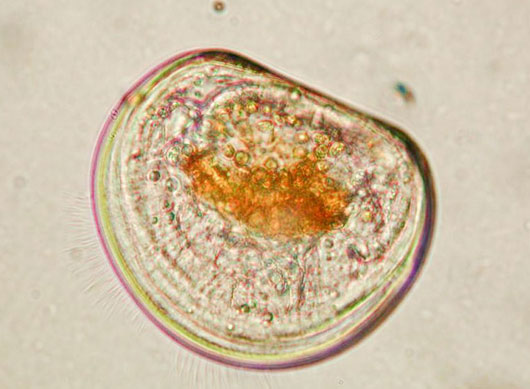Scientists discover noise pollution effects on shellfish

Man-made noise in the oceans may have significant damaging effects on shellfish populations, according to a new international study published today (Thursday 3 October 2013).
A team of researchers from the Scottish Oceans Institute at the University of St Andrews, Scotland, the University of La Laguna, Canary Islands and the University of Auckland, New Zealand, found that marine invertebrates, such as shellfish, suffered significant body malformations after being exposed to noise.
The team conducted a sound playback experiment on New Zealand scallop larvae, comparing their development to a control group kept in quiet conditions. The results show that the exposed scallops suffered significant development delays, with 46% of them developing body abnormalities, while no malformations were found in the controlled larvae.
The strong impacts observed in the experiment suggest that abnormalities and growth delays could also occur at lower noise levels in the wild, suggesting routine underwater sounds from oil exploration and construction could affect the survival of wild scallops.
Team leader, Dr Aguilar de Soto, from the University of St Andrews and the University of La Laguna said:
“Nobody knew that noise exposure could affect the growth of animals so dramatically so it was a real surprise to discover malformations in these microscopic larvae. What is actually going wrong inside the cells is still a mystery that we need to investigate. Shellfish larvae go through radical body changes as they grow and noise seems to disrupt this natural process.
“Fishermen worldwide complain about reductions in captures follow seismic surveys used for oil explorations. Our results suggest that noise could be one factor explaining delayed effects on stocks”
MASTS (Marine Alliance for Science and Technology for Scotland) senior research fellow Dr Mark Johnson of St Andrews said:
“Between shipping, construction and oil explorations, we are making more and more noise in the oceans. There is already concern about the possible effects of this on whales and dolphins. Our results show that even small animals could be affected by noise. It is important to find out what noise levels are safe for shellfish to help reduce our impact on these key links in the food chain”
The full report is published today in the Nature Publishing Group journal, Scientific Reports.
Notes to editors
View a copy of the research paper.
The researchers are available for interview and can be contacted on:
Dr Mark Johnson, University of St Andrews, 01334 462624 or email [email protected]
Dr Natacha Agiular de Soto, University of St Andrews and University of La Laguna, +34 636876526 or email [email protected]
Issued by the University of St Andrews Press Office
Contact Victoria Herd on 01334 462530 or email [email protected]
Ref:marinenoisepoll13
Category Research